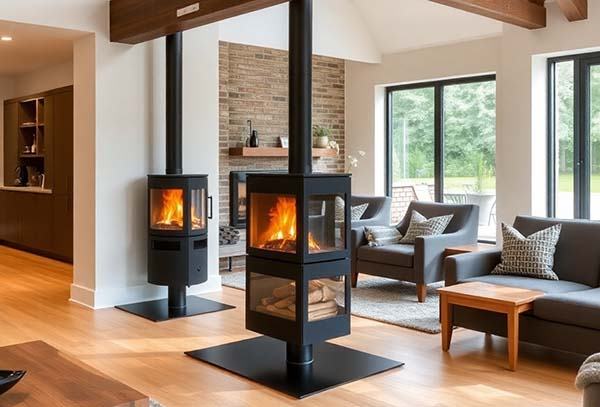Why it matters what you burn.
By Wes Dodd, WD Wood Burner Installations – Poole, Bournemouth & Dorset
One of the most common questions I get asked as a professional log burner installer here in Dorset is: “What’s the best type of wood to burn in my stove?”
Choosing the right wood makes all the difference. The wrong logs can cause excessive smoke, poor heat output, and a dirty chimney. The right logs, on the other hand, burn hotter, cleaner, and give you that cosy, crackling flame every log burner owner loves.
Here’s my guide to the best wood for your burner, what to avoid, and how to get the most from your stove.
Why the Type of Wood Matters
Not all logs are created equal. Different types of wood have different densities, moisture levels, and burn qualities.
- Hardwood vs Softwood: Hardwoods are denser, burn slower, and release more heat. Softwoods burn faster and can spit more, making them better for kindling than long-lasting fires.
- Moisture Content: Wet or “green” wood smokes heavily, produces less heat, and causes tar build-up in your chimney. Always use seasoned wood (dried for at least 12–18 months) or kiln-dried logs with a moisture content below 20%.
Burning the right wood improves efficiency, keeps your chimney cleaner, and saves you money on fuel in the long run.
The Best Woods to Burn in Your Log Burner
Oak
- Heat Output: Excellent
- Burn Speed: Slow, long-lasting
- Notes: One of the best woods for stoves. Dense hardwood that provides steady heat and long burns. Perfect for cold Dorset winter evenings.
Ash
- Heat Output: Very high
- Burn Speed: Medium to slow
- Notes: Ash is widely regarded as one of the top choices. It burns hot, produces a bright flame, and lights easily even when not fully seasoned.
Beech
- Heat Output: High
- Burn Speed: Medium
- Notes: Another hardwood that gives off steady heat and burns well once seasoned. A popular choice in Dorset homes.
Birch
- Heat Output: High but burns quickly
- Burn Speed: Fast
- Notes: Produces a good flame and nice smell but burns faster than oak or ash. Best mixed with slower-burning logs.
Hornbeam
- Heat Output: Excellent
- Burn Speed: Slow
- Notes: Very dense hardwood, burns long and hot. Ideal if you want a fire to last into the night.
Apple & Other Fruit Woods
- Heat Output: Good
- Burn Speed: Medium
- Notes: Produce a lovely aroma and steady flame. Great for both log burners and open fires.
Woods to Avoid in Your Wood Burner
Wet or Unseasoned Wood
High moisture content means poor heat, smoky fires, and more creosote in your chimney – increasing the risk of chimney fires.
Resinous Woods (e.g., Pine, Spruce, Fir)
Softwoods burn quickly and can spit resin, which clogs the flue and causes soot build-up. They’re fine for kindling, but not recommended for long burns.
Treated or Painted Wood
Never burn painted, treated, or manufactured wood (like MDF or chipboard). They release toxic fumes and damage your stove and flue.
How to Choose the Right Logs
If you’re buying firewood in Poole, Bournemouth, or Dorset, look for:
- Seasoned or kiln-dried hardwood logs with a moisture content under 20%.
- Logs that are split and stored in a dry, ventilated place.
- Local suppliers who can provide sustainable, responsibly sourced wood.
💡 Tip: A moisture meter is a handy tool to check your logs before burning.
FAQ: The Best Wood for Log Burners in Dorset
1. What’s the absolute best wood to burn in a log burner?
Ash and oak are top choices because they burn long, hot, and clean. A mix of hardwoods like beech and birch also works well.
2. Can I burn softwood in my wood burner?
Yes, but it burns faster and produces more creosote. Softwood is best for kindling rather than main fuel.
3. How can I tell if my logs are seasoned?
Seasoned logs are lighter, have cracks at the ends, and make a hollow “clunk” when knocked together. A moisture meter should read below 20%.
4. Can I burn wet logs if I have no choice?
You shouldn’t. Wet logs waste energy boiling off moisture, create smoky fires, and cause dangerous chimney deposits.
5. Where can I buy good logs in Dorset?
There are many local firewood suppliers around Poole, Bournemouth, and Wimborne. At WD Wood Burner Installations, I’m happy to recommend trusted suppliers.
6. Do kiln-dried logs burn better than seasoned logs?
Kiln-dried logs are dried faster and often have lower moisture levels, meaning they burn hotter and cleaner. Both kiln-dried and well-seasoned logs are excellent choices.
Final Thoughts
The type of wood you burn in your stove makes a huge difference to heat, safety, and efficiency. Stick with seasoned hardwoods like oak, ash, or beech, avoid wet or resinous logs, and you’ll enjoy a cleaner, warmer, and more cost-effective fire.
👉 If you’re in Poole, Bournemouth, Christchurch, Wimborne, or anywhere in Dorset and need advice on choosing the right logs or installing a wood burner, contact WD Wood Burner Installations today.




